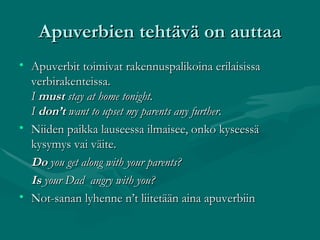Apuverbit 1
- 1. Apuverbien teht├żv├ż on auttaa Apuverbit toimivat rakennuspalikoina erilaisissa verbirakenteissa. I must stay at home tonight. I donŌĆÖt want to upset my parents any further. Niiden paikka lauseessa ilmaisee, onko kyseess├ż kysymys vai v├żite. Do you get along with your parents? Is your Dad angry with you? Not-sanan lyhenne nŌĆÖt liitet├ż├żn aina apuverbiin
- 2. Kahdenlaisia apuverbej├ż Taipumattomat (=modaaliset) apuverbit esiintyv├żt verbirakenteissa vain p├ż├żverbin kanssa. I canŌĆÖt call you because Mom may hear me. BE, HAVE ja DO taipuvat persoonissa ja aikamuodoissa. Ne voivat toimia my├Čs p├ż├żverbin├ż. I am very upset! I once had a dog.
- 3. Modaalisilla apuverbeill├ż ei ole kaikkia muotoja will would shall should ought to can could may might must
- 4. Be ja have taipuvat kaikissa aikamuodoissa ja persoonissa am, are, is was, were has been, have been had been will be would be would have been should be ŌĆ” has, have had has had, have had had had will have would have would have had should have ŌĆ”
- 5. Kiertoilmaisut Koska can ja may verbeill├ż on vain kaksi muotoa ( could ja might ) ja must verbill├ż vain yksi muoto, on muut muodot ilmaistava muilla keinoin. Be able to (=kyet├ż, pysty├ż, osata) My├Čs: manage to, know how to ym. Be allowed to (=saada lupa) My├Čs: be permitted to Have to (=pit├ż├ż, t├żyty├ż) My├Čs: need to, be forced to, be compelled to, be obliged to
- 6. CAN eri merkityksi├ż: Osata, voida, kyet├ż, pysty├ż I canŌĆÖt call you until I get my new mobile. ’āĀ I wonŌĆÖt be able to call youŌĆ” 2) Saada lupa I canŌĆÖt go out tonight, because IŌĆÖm grounded. ’āĀ IŌĆÖm not allowed to go outŌĆ” 3) Olla mahdollista You canŌĆÖt be serious!
- 7. MAY eri merkityksi├ż: Saada lupa May I answer the phone, please? (lupa l├żsn├żolijoilta) Is it allowed to use a mobile here? (yleiset s├ż├żnn├Čt) 2) Saattaa, ehk├ż I may be a bit late. I might pop in for a while. Huom! Maybe = ehk├ż (may + be yhteen!)
- 8. MUST eri merkityksi├ż Pit├ż├ż, t├żyty├ż, olla pakko I must go now. I have to be back by eight. Varmaankin You must be fed up with your parents! Huom! MustnŌĆÖt = ei saa DonŌĆÖt have to = ei tarvitse
- 9. Be able to / Be allowed to + verbin perusmuoto BE taipuu, muut osat pysyv├żt samoina am/are/is was/were have been / has been + ALLOWED TO / had been ABLE TO + infinitiivi will beŌĆ” I havenŌĆÖt been able to sleep lately. I will be allowed to stay out until eleven on Fridays.
- 10. Have to HAVE taipuu, to + verbin perusmuoto pysyy samana. have / has had have had / has had + TO + infinitiivi had had will haveŌĆ” Did you have to please your elders when you were young? I had to buy another ticket for my little sister.










